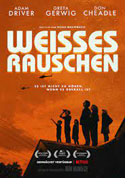

Opening 8 Dec 2022
Directed by:
Noah Baumbach
Writing credits:
Noah Baumbach, Don DeLillo
Principal actors:
Adam Driver, Greta Gerwig, Raffey Cassidy, Don Cheadle, Jodie Turner-Smith
When I heard that a movie had been made of Don DeLillo’s 1985 book White Noise, I was baffled by how anyone could turn this classic postmodern novel into a movie. Whether you’re like me and have read and loved the novel – or if you’ve never even heard of the book – you’re in for a treat. With this pitch-perfect adaptation, director/screenplay writer Noah Baumbach has created a satirical masterpiece and a fantastic black comedy.
White Noise is set in the late 1980s, and is the story of Jack Gladney (Adam Driver), a professor at a liberal arts college in the Midwest. Jack is an academic star in the field of “Hitler studies”, a field he invented and one that applies an unnervingly pop-cultural lens to history. He’s married to Babette (Greta Gerwig), and between them they have a bunch of children from their numerous previous marriages and one from their current marriage, as well as a shared fear of death. Driver, who I think is one of the most chameleon-like and watchable actors today, is excellent as Jack, a man who dwells in the hallowed halls of academia, performing for colleagues (such as his friend Murray played by Don Cheadle, who is obsessed with car crashes and Elvis) and students. When he’s not on campus, Jack is often with Babette and their brood in the pop art-influenced hyper-exaggerated supermarket, where American capitalist consumerism awaits them. When a freak environmental accident takes place, the family must confront their mortality, as Jack attempts to figure out what’s going on with Babette, who seems addicted to a mystery drug, while handling his own increasing fears.
It’s fun to watch Jack and Babette navigate this color-saturated version of America in the 1980s. White Noise turns out to be an oddly prescient story, warning of many things that remain problematic today, which makes it both nostalgic and eerily timeless. Baumbach effectively uses dialog to convey much of the novel’s social commentary and satire, visually honing in on the elements of dark humor and absurdity. This might just be one of the best movie adaptions of a book I’ve seen. (Diana Schnelle)